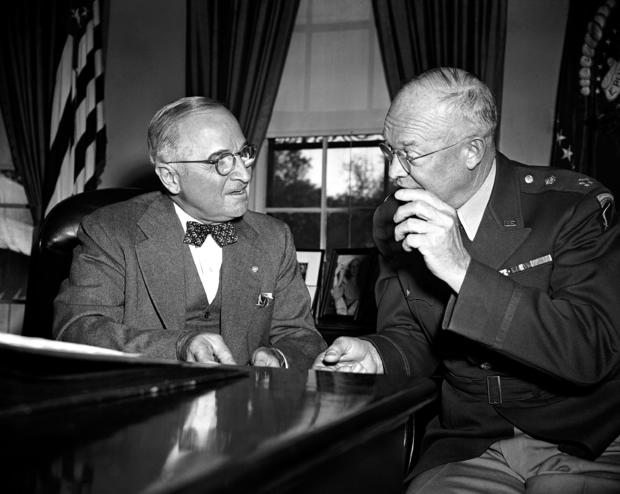Why do presidential nominees receive classified briefings?
As is customary for the official party nominees, Donald Trump and Hillary Clinton will be given the option to receive top-secret national security briefings as early as the next few days.
"There's a long tradition that the intelligence community at the appropriate time--and now is the appropriate time since both candidates have been officially anointed--that both camps will be reached out to and offered briefings," said Director of National Intelligence James Clapper, who oversees and conducts the briefings, at the Aspen Security Forum last week.
The practice dates back to the tenure of the 33rd president, Harry S. Truman. On April 24, 1945, just 12 days into his presidency, Truman learned that the U.S. was cultivating an explosive that potentially could destroy the world.
Secretary of War Henry L. Stimson and army general Leslie Groves fully briefed Truman on the Manhattan Project, explaining that Russia was on its way to developing atomic weapons within four years. They examined whether or not they should make their allies privy to the information and how the weapon could affect U.S. foreign-policy. Truman permitted the U.S. to continue the project and vowed not to leave any future commander-in-chief in the dark going forward.
In the summer of 1952, Truman decided that the candidates in that year's election should be presented with the option of receiving intelligence briefings, remarking at the time, "There were so many things I did not know when I became President."
General Dwight Eisenhower, the Republican, and Illinois Governor Adlai Stevenson, the Democrat, became the first party nominees to receive intelligence briefings in accordance with Truman's instruction.
Since that time, classified briefings have been offered to every party nominee. The CIA gave the briefings until the 2004 election, when the Director of National Intelligence took over.
This election cycle's briefings have been thrust into the spotlight as both the Trump and Clinton camps have suggested the other candidate is unfit or unprepared to handle classified information and should not receive the briefings.
During a press conference last week, Trump said "Russia, if you're listening, I hope you're able to find the 30,000 emails that are missing," urging a foreign adversary to commit cyber espionage against former Secretary of State Hillary Clinton. "I think you'd be rewarded mightily by our press," he added.
"Donald Trump once again took Russia's side," Former CIA Director and Defense Secretary Leon Panetta said in response that evening from the Democratic National Convention in Philadelphia. "We cannot afford an erratic finger on our nuclear weapons."
Senate Minority Leader Harry Reid also responded that night from an event before the Nevada Democratic delegation at the convention. "I hope that they don't tell him [Donald Trump] anything" because "you can't trust him."
Republican officials have similarly argued that Hillary Clinton should not receive classified briefings.
In an open letter to CIA Director of Intelligence James Clapper, Speaker Paul Ryan wrote, "I am writing to formally request that you refrain from providing any classified information former Secretary of State Hillary Clinton for the duration of her candidacy for president." Given the FBI's findings that Clinton sent and received emails containing classified information during her time as secretary of state, Ryan explained that denying her access to classified information would be an appropriate sanction.
Clapper denied Ryan's request, citing that "Nominees for president and vice president receive these briefings by virtue of their status as candidates, and do not require separate security clearances before the briefings," Clapper wrote. "Briefings for the candidates will be provided on an even-handed non-partisan basis."
